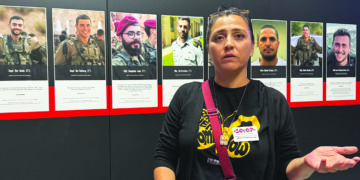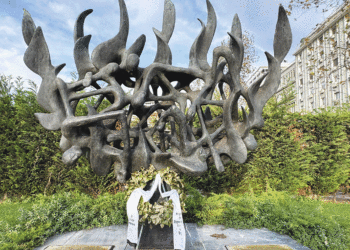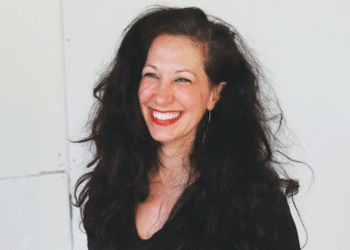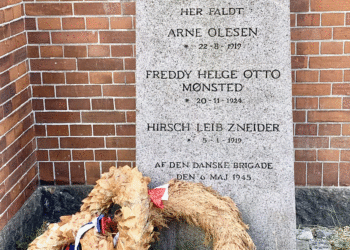By JON STONE
For as long as I can remember, one phrase above all others signaled the presence of spring: “Next year in Jerusalem.” It’s the seder’s final sign-off, which, of course, my family and many around the world would recite to mark the end of the traditional Passover meal.
Around that time, two years ago, our daughter Dahlia declared her desire to embark on a journey to an entirely different destination.
“I want to go to Berlin,” she said, “for my full junior year.”
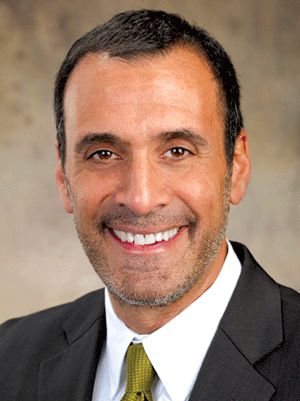
Her unblinking eyes held the same wisdom of the world that they had since soon after her birth, but which once belied a vulnerability that would have made this moment seem improbable. Like most parents, my wife Linda and I would often wonder what path our child would choose to pursue.
And as parents of Dahlia, a girl who navigated the incongruities of adolescence and high school to find a fit at Sarah Lawrence College, this declaration unleashed our own customized angst: how to forgo the secure comfort we came to enjoy of time together every few months, while she studied the next two semesters in Germany.
To give the okay would cut a proverbial cord that connected us to our firstborn while she ventured independently into a foreign culture with a scant command of the native tongue. But we did, and Dahlia’s younger brother Isaac was quick with a gift that he hoped could help her fill another void: a contact number for a family in Berlin, the Majetschaks.
Isaac, then a college freshman, knew of this family through the youngest daughter, Louise, a Berlin resident and his former fellow camper at their northern Wisconsin camp. Over the course of Louise’s summer travels there, the two developed a romance. By his thinking, Louise, her sister and their parents could help Dahlia, in whatever form that help could come in handy.
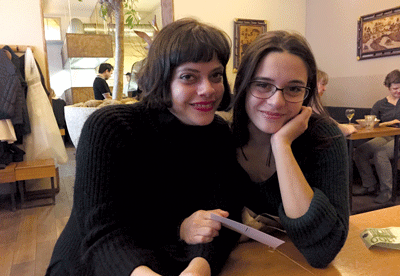
Once she touched down in Berlin, everything we knew about Dahlia’s state of being we learned through the small screens of our FaceTime-fed iPhones: navigating the newness of life as a foreign student; strategies to secure bouncers’ nods at coveted clubs; and, as her first semester wound down, how she’d manage the program’s mandate that full-year Berlin program juniors find a place to live while its dorms closed for six weeks over winter break.
During this period of time, TV transmitted to us Germany’s steady status as the world’s top story. The meandering balloons that marked 25 years since the Berlin Wall’s fall brought us closer to her, knowing she watched in person. Chancellor Angela Merkel’s Brandenburg Gate admonition that anti-Semitism cannot be tolerated moved us, and helped to calm our ongoing concern for her safety.
But what mattered most to Linda and me was keeping current with Dahlia about her adaptation to day-to-day life, and increasingly, over the many months of our video conversations, she shared word of her blooming relationship with the Majetschaks. We learned how they once invited her to their West Berlin home for Sabbath dinner, and then continued to do so, week after week; and how their insistence placed her among company over Hanuka, which she would have otherwise spent alone.
And when she discovered that male co-boarders in her winter break flat had rummaged through her duffel, decorating their room with her undergarments, we heard how the Majetschaks raced across town to retrieve her until those miscreants moved on. An ocean apart, we felt impotent in our ability to adequately express to them our ongoing gratitude.
By February, Dahlia had been gone seven months — two times longer than her longest time away, and despite our virtual connection, the prospect of a quarter year more apart caused Linda and me to ache.
Isaac, however, had no intention of waiting beyond March to travel to Berlin. He lopped a job at the school’s food service on to his studies to help pay his way toward a spring break flight. He could load his clothes into a carry-on and be off.
Dahlia was a draw, of course, but his heart headed him to Louise. It greatly satisfied us that now, two of our three kids would be in the same city and together in the company of this family — over spring break and, in particular, the Passover holiday. It also brought to the forefront our discussions of how the rest of us might cobble together a way to travel there ourselves. Maybe we could make it over the spring break of our daughter Amira, a student at St. Louis Park High School, which fell during the same week as Isaac’s. Or, more likely, just after the program’s final semester in June when we’d all have far more freedom to travel.
Early one morning in February, an incoming email to my phone from my employer, a German-based global health care company, woke me. “Dear Jonathan: You are cordially invited to attend the Leadership Conference 2015,” it said. “The meeting will be held from late Wednesday afternoon, March 25th, until Friday 27th. We look forward to welcoming you to the Leadership Conference in Frankfurt and to a successful meeting.”
The dates fell squarely within Isaac’s travels and Amira’s break, and the news from my workplace set off a lightning speed succession of thoughts that progressed something like this: “Leadership meeting… March… Frankfurt… Berlin?… Dahlia?… WHOLE FAMILY?”
I nudged my wife awake and we made a decision. We would see our daughter in just four weeks, right after my travels to Frankfurt.
The Saturday after the conference, about an hour after Linda and Amira’s transatlantic flight touched down and a day before Isaac’s would do the same, my flight from Frankfurt landed in Berlin and taxied to the terminal where the three female Stones waited. Amidst the cheer and tears of those early moments with Dahlia, we agreed that the week ahead would be wide open, with no scheduled plans.
The only exception was the following Friday and Saturday nights. The Majetschaks, it seemed, had invited our family to join theirs for Passover seder.
The days to follow were a blur, through both the fast passage of time and the climate. Gusty, drizzly, high 30-degree weather forced us inside, to create what would become a montage of memories in museums, markets, cabs and cafés. By now, Dahlia had mastered the fundamentals of basic German exchange (“I would like whiskey, please,” “Drive us to Prenzlauer Berg, please”) and could lead us with confidence through those neighborhoods and to those sites that were central to her time in the city.
She temporarily moved into our hotel room and made up for her months away from Amira, sharing a bed and late night laughter. Days were near perfect, simply because she was now a part of so many of them.
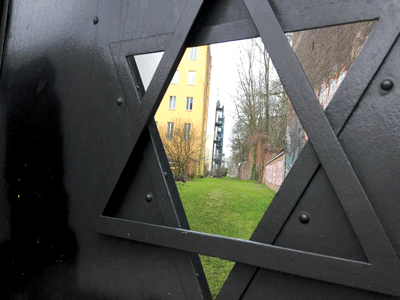
We spent some time with Isaac and Louise but did not aspire to have too much full family time, because the two made their plans separately. On that Passover eve, before the last days of our trip expired, we knew we could count on at least a few hours together. Our cab passed vestiges of the country’s proud and ghastly past as it drove from East Berlin to West before it slowed, down then stopped in front of the steps on which Louise’s sister Sarah and our son, neatly groomed, crisply dressed and smiling, waited for us.
“Hi Mom, hi Dad, hi Amira,” he said, and he hugged us.
They led us up several flights of stairs and opened the door. We stood face to face with Louise’s parents, Beate and Stefan Majetschak, with Dahlia and Louise inside and beaming in the background.
The Passover seder we would read offered the annual, multi-millennial recounting of the Jews’ exodus from Egypt, but the firm familiarity that struck me at that moment — here, on this evening, around this table, all of which would have collectively seemed so improbable one year before — came from a different place.
The feeling grew throughout the seder, spoken and sung in English, Hebrew and German; it was a palpable sense alongside our family and several strangers, that despite all historic and logistical odds, serendipity, perhaps fate, but certainly love, placed everyone exactly where they needed to be: inside the Majetschaks’ home, squarely within Berlin.
***
Jon Stone and his family are longtime residents of Minnetonka. Jon serves as head of communications for Fresenius Medical Care in North America.



